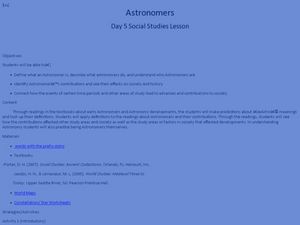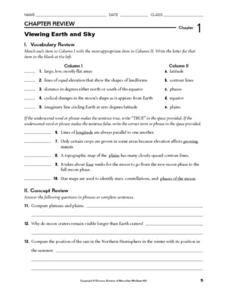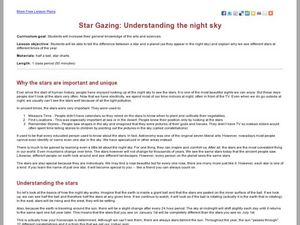Curated OER
Mother Earth - Father Sky
Third graders research and write about Cyrus Dillan. They explain one of Dillan's sculptures. Students locate six constellations and two planets. They research and write about the daily life of the Pawnee.
Curated OER
"Space" Investigations
Sixth graders understand the patterns of change observable on Earth as a result of the movement of the different bodies in the solar system. They identify the physical characteristics of the different components of the solar system.
Curated OER
Astronomers
Students explore the profession of astronomy. In this social studies instructional activity, students read articles on astronomers contributions to society and history. Students reference the Bible for recorded astronomies impact on...
Curated OER
An Introduction to the Night Sky and Movement Astronomy
Basically, this is an interactive exploration of educational astronomy software and an app. Young astronomers discover how the apparent motion of the sky relates to Earth's movements and the position of the observer. It is out of this...
Curated OER
Space Jeopardy Game
Young scholars explore space. For this space lesson, students analyze the sky and what causes its changes. Young scholars describe the moon patterns and use a model to show changes in its shape. Students also describe the first trip to...
Curated OER
The Big Bang Theory
Students will use scientific reasoning to formulate ideas about the formation of the universe using the Big Bang Theory. The use of critical thinking skills is part of the activity and the foundation of the scientific method will serve...
Curated OER
The Speed of Galaxy Q2125-431
In this speed of a galaxy instructional activity, students use a given equation for the speed of an object and they use the spectral lines for Hydrogen Alpha and Beta from the Seyfert galaxy to answer 6 questions. They determine the...
Curated OER
Modeling the Big Bang and the Formation of the Universe
Sixth graders conduct an experiment to understand the Big Bang Theory. In this Big Bang Theory lesson, 6th graders will observe a balloon with confetti popping to emulate and analyze information related tot he Big Bang theory. Students...
Curated OER
What's Your Sign? The Science Behind The Zodiac
Students investigate the concepts dealing with the motions of celestial objects, the ancient origins of the Zodiac and the science behind the Zodiac.
Curated OER
Life Cycle Of Stars
Students investigate the concept of stars and how they go through a life cycle. They take part in class discussion with the help of dialogue provided in the lesson plan. Students also view a powerpoint presentation for visual learners.
Curated OER
Advanced Critical Reading: Generations
In this critical reading worksheet, students read a passage about cycles of American generations then answer three questions based on the reading.
Curated OER
Plan a Mission to Recently Discovered Planet
Young scholars plan a mission to a recently discovered planet. In this science lesson plan, students research spacecraft design, distances in space, long-term missions in space, and life-sustaining planets. Young scholars work in groups...
Curated OER
Changing Families Lesson Plan
Students examine the increase of multigenerational families living under one roof. In groups, they discuss how more generations are affecting younger generations and how the family structure affects the relationships in families. They...
Curated OER
Astronomy
Middle schoolers brainstorm about what they know about the solar system. They study a planetary fact sheet and create a Venn Diagram with the information. They work in groups to examine the names of the planets and information regarding...
Curated OER
Viewing Earth and Sky
In this earth and sky worksheet, students review terms associated with map reading. Students also review topographic maps and how contour lines represent elevation. This worksheet has 5 matching, 5 true or false, 5 fill in the blank, and...
Curated OER
Star Gazing: Understanding the night sky
Students observe star charts to understand the difference between a star and a planet. In this star lesson plan, students also explain why we see different stars at different times of the year.
Curated OER
The Milky Way and Beyond
Students consider the scale of the Milky Way Galaxy. In this Milky Way lesson plan, students hypothesize the length of time necessary to cross the Milky Way.
Curated OER
The Next Logical Step in Astronomy
Students research future astronomy endeavors and how the exploration with contribute to astronomy and humanity. In this astronomy lesson plan, students research, present, and debate the topics as a class.
Curated OER
A Model of the Sun's interior
Young scholars create a three-dimensional model of the sun. In this solar system activity, students design a scale model of the sun using plasticine.
Curated OER
an Explorative Journey Through the Solar System
Students, in groups, research a planet from our solar system. They create Styrofoam models of the planets and place the planets on a correct distance scale from the sun.
Curated OER
Our Home in the Milky Way
Young scholars gain appreciation of the vastness of our galaxy by viewing an applet about the Milky Way. Students hypothesize about how long it would take to get from Earth to Pluto.
Curated OER
Underground Travelers
Students are introduced to new vocabulary associated with the Underground Railroad. Using primary sources, they evaluate the railroad's impact on society in the past and today. They also make a judgment about the morality of the railroad...
Fun Brain
Fun Brain: Space Hopper Constellation Game
Players identify constellations by multiple choice or by typing in the correct name. Two skill levels. Includes links to Fact Monster dictionary, encyclopedia, and atlas entries about constellations.
Science Buddies
Science Buddies: Using a Digital Camera to Measure Skyglow
This is a great project for someone that is interested in both stargazing and photography. Bright city lights and even the light of the full moon obscure the dimmest stars, which can make identifying constellations more difficult. This...

























